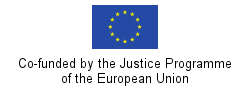
Microsite PRALT
Main activities
- Overview of the situation of radicalisation among youngsters in Europe and the use of alternatives to detention in EUMS: providing in-depth research on the situation of radicalisation among youngsters and the use of alternatives to detention in the 28 EUMS. This research is provided by two external consultants, specialists on radicalisation and judicial training issues, who are also in charge of the training package. A group of 4 experts also contributes to this diagnosis and analysis by sharing their knowledge and experience in order to improve the contents of the training package. Furthermore, each partner participates to the research by providing a national report on the situation of radicalisation and the use of alternatives to detention in their home country.
- National practice-oriented training and knowledge sharing: exchanging policies, learning from good practices and training of the trainers concerning the prevention of radicalisation and the use of alternatives to detention in partners' countries. This activity, in which all partners will participate, consists of 3 national meetings organised in Germany, Belgium and Spain, each one being focused on a specific theme and composed of a national workshop to exchange on good practices, a study visit and a training session led by the two external consultants -who produce the training package.
- Training manual: production, and subsequent translation into national languages, of a training package. The training manual is composed of 5 volumes: 1. European policy and theoretical framework; 2. Prevention of radicalisation in detention; 3. Community-based and family intervention; 4. Tertiary prevention experiences; 5. National reports and highlight of good practices. It is intended for the partners and national stakeholders in order to allow for its dissemination at a national level in the partner’s countries through national workshops.
- Online training course: production of a self-learning activity based on the training manual and hosted on the IJJO e-learning platform in each of the partners’ languages that will be open to stakeholders in each partner’s country.
- Knowledge diffusion and final conference: recommendations on the prevention of radicalisation and the use of alternatives to detention for youngsters will be embodied in a policy brief, while the results of the project will be presented during a final conference in Paris that will bring together all the partners of the project and European Council for Juvenile Justice’ members (especially from the Judiciary and the Public Administration sections).

The website section for this project was funded by the European Union’s Justice Programme (2014-2020). The contents of it are the sole responsibility of the “The prevention of juvenile radicalisation: Promoting the use of alternatives to detention through judicial training” project partners, and can in no way be taken to reflect the views of the European Commission.